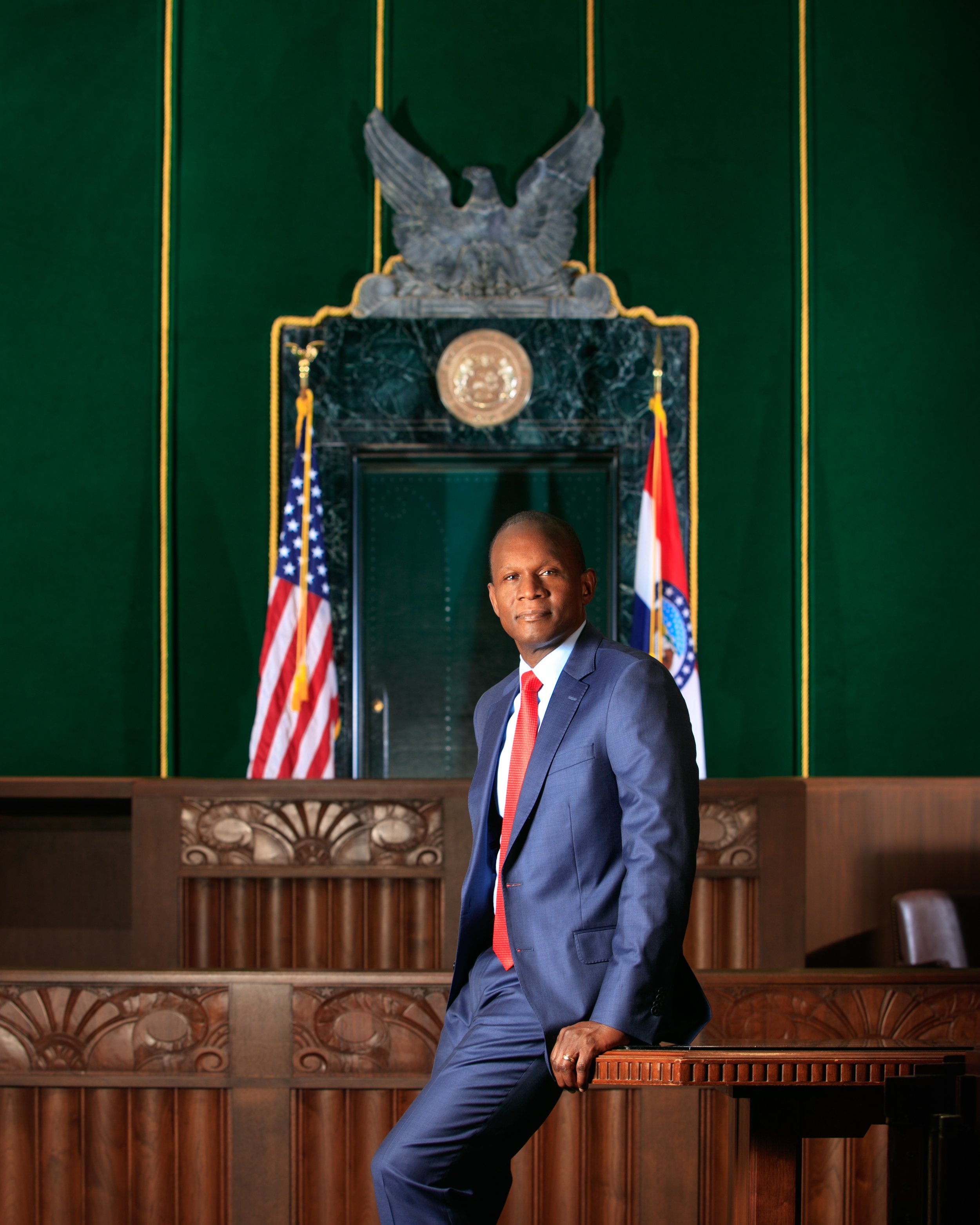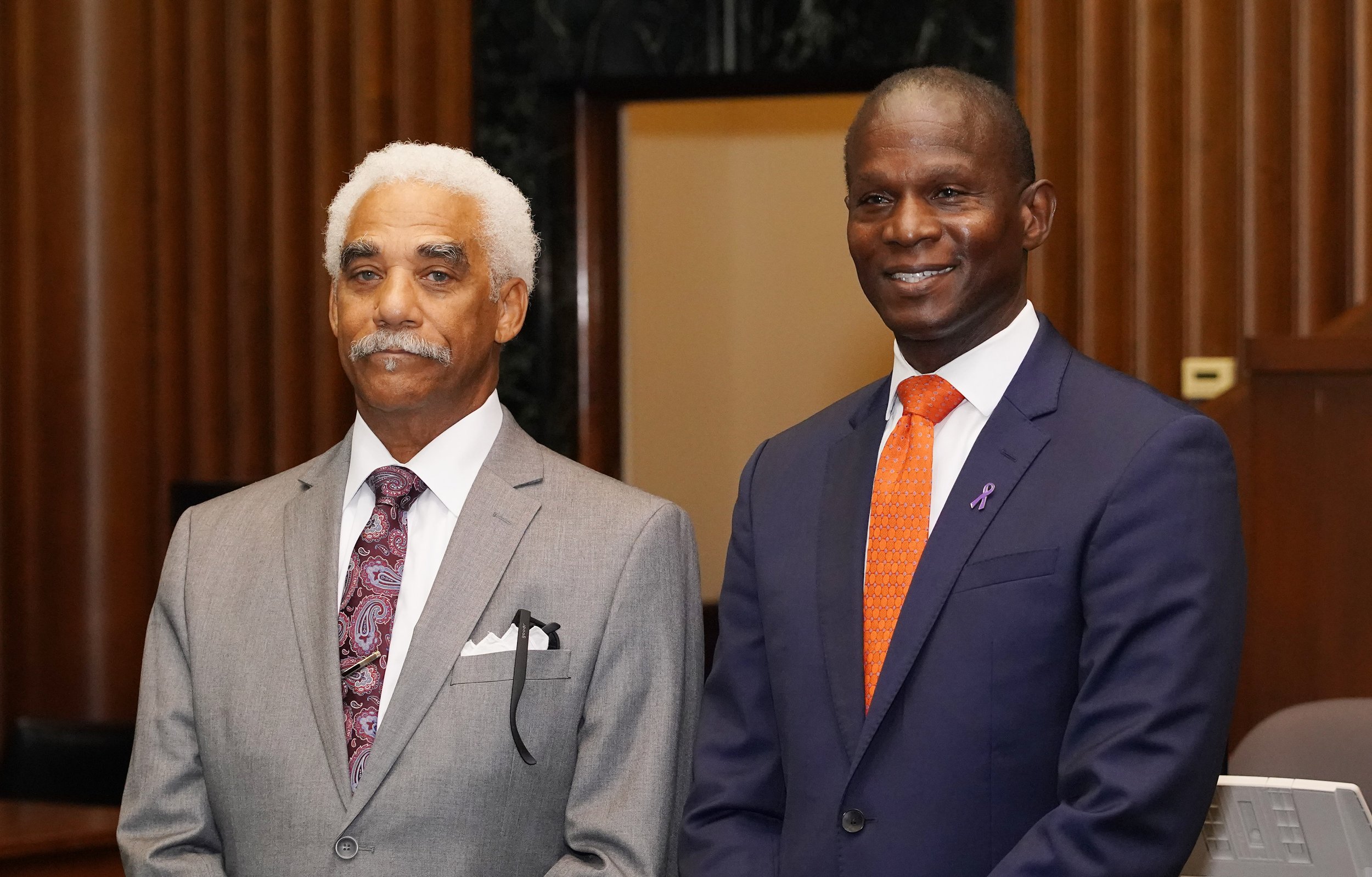Digging Out of a Ditch
Gabe Gore was named St. Louis Circuit Attorney when the office was in a state of complete chaos and violent crime had reached epidemic proportions.
By Christy Marshall Portrait by Suzy Gorman
Taking over as the Circuit Attorney of St. Louis in 2023 was a lot like grabbing the helm of a dinghy in the middle of a hurricane. The staff had dwindled to less than two dozen attorneys, police were requesting arrest warrants that were never issued, homicides went unprosecuted, crime climbed steadily, and the person in charge, Kim Gardner, was pursuing a nursing degree … in her spare time.
Hello, Gabriel Gore.
Gabe Gore, City of St. Louis Circuit Attorney.
Appointed last May by Missouri Gov. Mike Parsons, Gore was tasked with bringing the office back from the brink. A reluctant politician in a keenly political job, Gore left the comfy confines of the blue-chip Clayton law firm Dowd Bennett to assume what had to be the hottest seat in town. Yet he was composed. Collected. And now, eight months later and in somewhat calmer waters, it appears Gore is successfully righting the ship.
“It has been said that it is one of life’s great blessings to have the opportunity to work on important work,” Gore says. “That’s what we have in this office. In droves.”
Federal Courthouse, St. Louis.
His road to becoming a lawyer began in Detroit. He was in grade school—12 or so. “In grade school, I was not known as a particularly stellar student,” he admits. “I was considered a behavioral problem, which really stemmed from the fact that I came from a house of six kids and we kind of ran wild. So, it didn't seem to me that I shouldn't be doing that at school.”
Then, in 7th grade, he took a civics class, mandated by Michigan State law. “We got into some of the landmark Supreme Court cases, Marbury v. Madison, Brown v. Board, that kind of stuff,” he says. “I just found the subject matter fascinating.”
A teacher who had spotted Gabe as a potential problem noticed he was finally engaged and interested. “He was the first one to tell me, I’d make a great lawyer someday,’” Gore says. “That was the beginning of that interest, and it just kind of continued. In my mind, I started saying, ‘Well, yeah, I guess I'll be a lawyer if I’m not a professional basketball player.”
Then there was Miss Dick, “the meanest teacher in the 7th grade.
“She was the one who made it her own point to make sure that I was not a behavioral problem,” Gore says, laughing. “I spent a lot of time with her. But she was also very encouraging. She started putting me into things that were for the more academically inclined students. She volunteered me to be in a creative writing contest and she put me in this quiz show, like a mock 'Jeopardy’ game that you did in front of the assembly. It was always the really smart kids up there, and everybody suddenly was like, ‘What??! Gabe's up there?’ And she had done that.”
When Gabe was 14, his father, already working at Chrysler, was transferred to St. Louis to reopen a plant to build minivans.
“Our joke about my dad is that ‘he’s easy like a Sunday morning,’” Gore says. “He’s a very hard worker. At Chrysler, you work first shift, second shift, third shift—your shift goes from three until two in the morning. For most of his career, he was working twelve-hour shifts because you're building as many cars as you can.”
The move from Motor City to West County was a culture shock. Urban to what was then rural. All black to nearly all white.
“In my school in Detroit, you could count the number of white people on one or two hands,” Gore recalls. “And then I went to a school that was predominantly white where there were maybe 20 black students.”
He ran track, played basketball, made friends, and again caught the eye of a couple teachers.
“I took a class at Parkway called Pre-Law,” he recalls. “It was a law class taught by Mr. Regenbogen. He was a young guy. He always talked about how he went to, like, eight different colleges before he graduated. He taught the law class because he did two years of law school, and he quit because he decided he wanted to be a teacher.”
Bogan, too, assured Gore that he had the makings of a fine lawyer. So, when he enrolled at Missouri State University in Springfield, he declared his major, pre-law, on the first day. He was assigned a pre law advisor, a professor by the name of Alice Fleetwood Bartee.
“She was really huge for me,” Gore says. “I never had a lawyer in my family. I knew nothing about the process.” She taught him how the world of law worked.
He was the first Southwest Missouri State University student to go to University of Chicago Law School.
There, in a class on criminal procedure, he met his future wife, Nicole Reid. They married in 2006. She’s now associate dean in the Office of Student Conduct and Community Standards at Washington University. Their daughter, Grace, graduated from Wash. U. and now lives in Brooklyn, N.Y., doing crisis management public relations. Their son, Zachary, is a junior at Wash U.
Gabe and Nicole Gore.
Hanging on the wall of Gore’s office in the Carnahan Courthouse is a series of framed documents carefully hung in chronological order. There is his letter from U.S. Federal Court of Appeals Judge John R. Gibson accepting Gore’s resignation at the end of his clerkship. Then his appointment to the United States Attorney’s office of the Eastern District of Missouri, where he worked in the violent crime unit. Then another letter, signed by then U.S. Attorney General Janet Reno, assigning him to the federal investigation of the Waco siege.
Gore had moved on to private practice at Dowd Bennett before being tapped to take the Circuit Attorney job. Waiting for him when he arrived was a backlog of 4,500 still pending applications for warrants that had been made by the police but had not been issued.
“I said, ‘Day One, if you're in a ditch, what's the first thing you do? You stop digging.’ So, I'm like, let's start fresh today, and let's make sure we're not creating any more backlog.’”
Gore reopened the warrant office and informed the police of a new procedure: “You don't have to just email your application for warrants in. We want you to come in in person. We want you to bring your witnesses, bring your victims. We want you to explain to us your evidence, and we're going to make a charging decision that day about whether or not we're going to charge this person.” Now, he says, the vast majority of cases worth pursuing are charged within 24 hours of application.
After he stopped digging, Gore immediately started adding staff—and rehiring attorneys who fled under Gardner. They started to plow through the 6,700 filed applications “to identify the most serious cases right away,” Gore says. They also found 250 homicides in the backlog. After eliminating cases that were no longer valid due to the statute of limitations, that lacked sufficient evidence to proceed, or had been filed multiple times, the attorneys were able to whittle the number down to 4,176 cases.
From the end of June to December, Gore’s office filed charges in more than 2,650 cases. (Kim Gardner filed about 1,460 over the same period, a year prior.)
When Gore arrived, the Circuit Attorney’s office was staffed with 22 trial attorneys and three others working exclusively on child support. He’s added 24 attorneys and 14 support staff — and he says it’s still not nearly enough.
Chief Warrant Officer Steve Capizzi, Director of Diversion Programs Jennifer Lorentz, Circuit Attorney Gabe Gore, Victim Advocate Kathleen Small
“Ideally, you would probably want a homicide prosecutor carrying 40 cases,” Gore says. “I would say our homicide prosecutors are currently carrying probably 80 to 100. In violent crime, you might want an attorney covering carrying 60 to 80. Our violent crime attorneys are probably carrying 100. General felony attorneys, you probably want carrying, like, 200 cases. We've got general felony attorneys carrying 300 cases each.”
But as hard as Gore works and as many warrants are issued and trials held, fears of downtown crime persist. The Circuit Attorney argues that those fears are unwarranted.
“I am here every day,” he says. “Me, and my staff, we're here every day. I feel safe here. I live in the city. I walk to lunch. I go for drinks after work. There's no doubt that in St. Louis we have a violent crime epidemic. I think the perception that downtown is not safe is a misperception. There's too much violent crime in all areas of our city, but it really is concentrated in our lower socioeconomic areas, where you have the violence at epidemic proportions and where our office is focusing most of our attention. Downtown is not one of those areas.”
But as misconceptions linger and the number of guns on the streets climbs, the daily grind of pulling out of a past administration’s morass is overwhelming. But clearly Gore is willing to wage the fight. In early December he announced that he would be running in the November 2024 election to keep his current job. A man who clearly suffers no fools, he was initially reluctant to recast himself as a politician.
“I never signed up to be a political candidate,” he says. “I am an attorney.”
That future was settled at age 12. Now that the office has stopped digging and started untangling the chaos he inherited, Gore can run on his record. His accomplishments veer beyond the courtrooms. He added Leann Mosby as the Director of Community Engagement in order to create relationships between the public and his office. He hired veteran Post-Dispatch journalist Christine Bertleson as his public information officer to ballyhoo the office’s successes. Gore has also reorganized the office’s diversion programs.
Gabe Gore with one of his new assistant circuit attorneys, the Hon. George W. Draper III.
In a press release heralding his first six months as Circuit Attorney, Gore said: “When I took office, there were fewer than 40 participants in all our diversion programs and partnerships with the Circuit Court. In next six months, we anticipate that there will be about 300 participants in our felony and misdemeanor diversion programs. In addition, we will be much more active in utilizing our the 22nd Judicial Circuit’s Treatment Courts.”
Now Gore’s task is reversing the tide, making St. Louis safer, and running to keep his job.
“When I said failure is not an option, it is not an option that we have a failed circuit attorney’s office in the city of St. Louis,” Gore says. “This office has to function, and it has to function effectively... That is something everyone in the city has to be engaged in.”
You can contact Gore at circuitattorney.org, or on social media at Facebook, LinkedIn, or Instagram.







